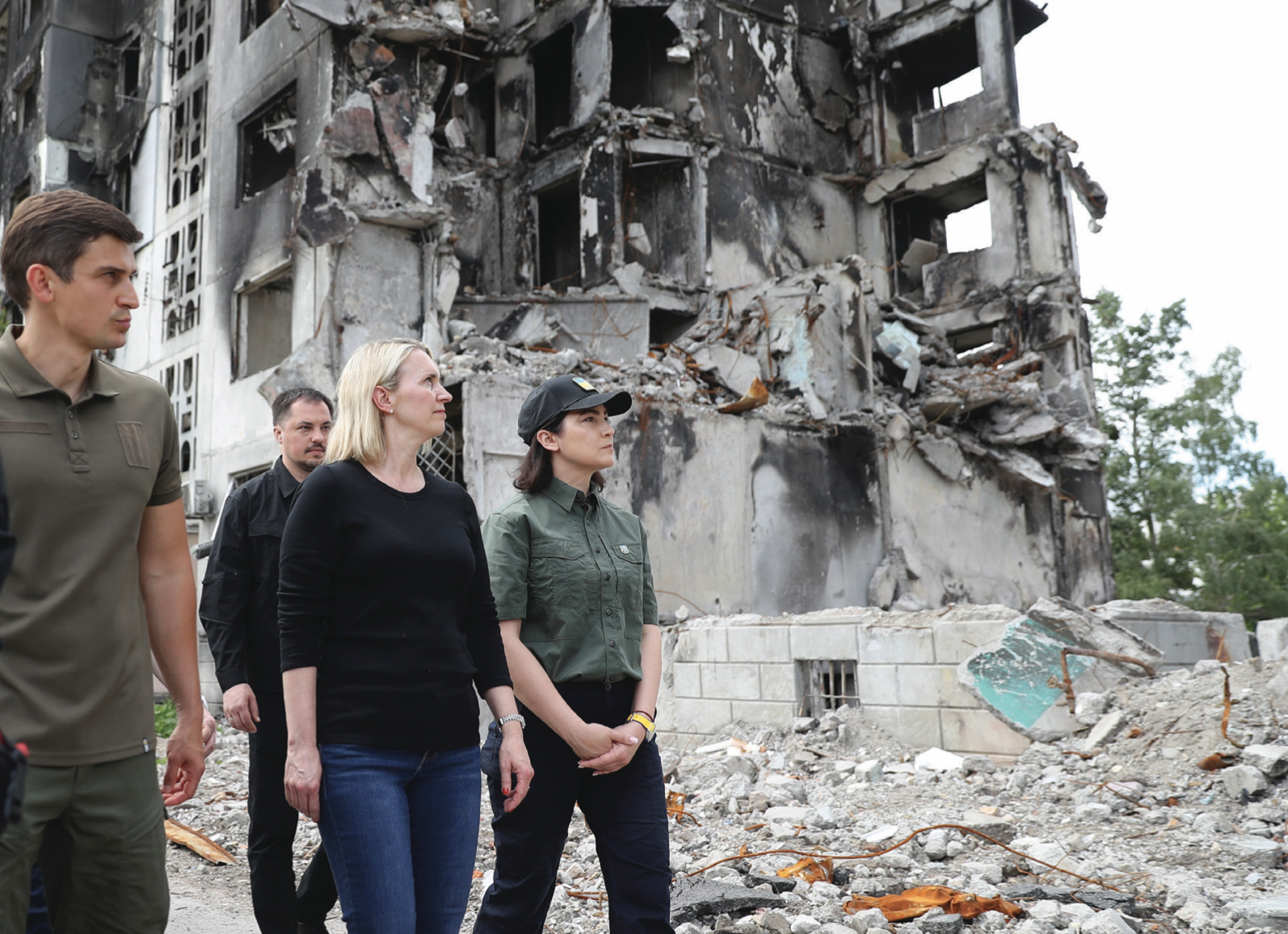
Death had not been part of the plan.
As the 20th century was drawing to a close, Bridget Brink, then a young and freshly trained American diplomat, was on her first assignment, half a world away, in the middle of a war zone.
She had not asked to be there. She knew that she wanted to be an ambassador — she’d learned languages, done the necessary coursework and training, gone through the rigorous vetting process. While she recognized that some people assumed being an overseas diplomat meant nothing but attending cocktail parties and rubbing shoulders with foreign leaders, she knew it was hard work.
But this — Belgrade, Serbia, the epicenter of the Balkan conflict, the kind
of thing that heretofore had only existed on a television set or in a newspaper, distant, hardly real — this she had not expected.
She had already borne witness to the “brutal, horrific acts” of war, but those now felt closer than ever: Some of her contacts, civilians she’d worked with and gotten to know, had been killed.
Losing people wasn’t the kind of thing she had thought about during her training as a diplomat, and certainly not in college. The Grand Rapids native’s initial plan was to become a doctor. Her grandfather had served as a physician in World War II, and part of her family lore was how he
had treated Dwight Eisenhower when he was still only Gen. Eisenhower — before he was president.
Brink went to Kenyon College in Ohio and took a science course, “and maybe for the first time in my life, I didn’t do so well,” she says. Then, she took a political science class, and everything changed.
One question in particular drove the course: What is justice?
The conversations and debates that took place in that class room opened up a new world of ideas and ultimately set her on a new path, one that would take her to study abroad in London her junior year. That time abroad clinched it. She knew she’d live a life that would expose her to the rest of the world. She would be an ambassador.
College had been fun and inspiring. Belgrade was horrifying. Brink was in her late 20s, on an assignment she didn’t choose, beginning a career that was far removed from idealistic classroom debates about justice. She struggled to accept the fact of her contacts’ deaths, to process it. She could not help but wonder if she had, inadvertently — in her efforts to ultimately help them — put them at risk.
Much is involved in learning to be a diplomat. Brink completed language courses (she is fluent in Russian and has studied Georgian, Serbian, and French), among other forms of training. But her real education took place on the job. Diplomacy, she now says, is learned through apprenticeship. It’s learned in real time, from mentors, and she was lucky, she says, to have good mentors. Struggling with the deaths of her contacts, she turned to one of them for help.
“I didn’t plan for this. I didn’t prepare for this,” she told him. “I didn’t think this is what it would be.”
He put his hand on her shoulder.
“You didn’t know that,” he said. “But this is what it is. And you can do it.”

Sitting down for a Zoom call in her office in Kyiv, Ukraine, in late July 2022, Bridget Brink, the U.S. ambassador to Ukraine, lays out the five goals she has for helping Ukraine in its war with Russia.
“And they are five enormous goals,” she says with a smile, a smile that remains almost a constant throughout her interview — a surprising smile, not the kind you might think you’d find in the middle of a war zone, in a conflict Ukrainian officials estimate has cost the lives of as many as 13,000 of their soldiers and almost 7,000 civilians.
It is about 4 p.m. Ukrainian time, and Brink has been up since 5 o’clock in the morning. She will go to bed likely sometime in the evening, Eastern Standard Time, after she gets off the phone with Washington, pushing her workday far into the night. Earlier in the day, she visited and handed out supplies to Ukrainian rescue workers, people who dig through rubble and cut through concrete looking for bodies or survivors, reminding them to watch out for Russian mines planted in homes or sometimes even disguised as children’s toys.
It is among the times her smile, which feels like her default expression, wanes as the subject turns to the harsh realities of the job.
“They’ve lost some of these folks, because obviously it’s very dangerous work. So it was a great pleasure to go there and to distribute assistance from the American people to aid them in saving the lives of their fellow citizens, including the lives of children,” she says. “It’s one of the more heart-wrenching things to see, but it is one of the more heartwarming things to be able to participate in and hand over these goods together with my team here.”
When she has time, Brink tries to work in some self-care — exercise if she can squeeze it in or simply visualizing the west Michigan lakeshore.
“When I need a place to go in my mind,” she says, “that’s exactly where I go.”
Tomorrow, she will be up again at 5, starting her day as she usually does, sitting down with her team and discussing the plans and strategies for the day. Once the apprentice, she is now, a quarter-century later and in the middle of another violent conflict affecting the entire world, the master.
At the moment, Brink appears, sitting at her desk, dressed in black blazer and flanked by an American flag and a bookshelf, very much at home — and, in some ways, she is.
Home is where the conflict is. She was born and raised in Grand Rapids but for the past 26 years has been traveling the world as a diplomat along with her husband, who also works in the Foreign Service, and their two sons.
In a 2019 speech, just after she was sworn in as ambassador to Slovakia, she thanked her boys alongside some of America’s highest-ranking diplomatic figures.
“Of all of the titles, ‘mom’ is the best. As part of a diplomatic family that has moved every few years for their entire lives, I want to thank and recognize them for their own service to our country,” she said.
That was a different time, in a different country, one that neighbored Ukraine but had a different relationship with the U.S. At that time, her goals included looking for ways to increase trade and investment, as well as “to continue our cooperation in the defense sector.”
In the absence of war, perhaps it was easier then to sneak in some more lighthearted comments: “In addition to our shared interests, as many people know, we are big hockey fans,” she said, while the assembled crowd laughed.
Now, in Ukraine, the situation — and her goals — are very different. Her top five priorities include making sure Ukraine can defend itself, that humanitarian aid is getting to its intended recipients (no easy task in a war zone), and that the assistance the U.S. is delivering is accounted for appropriately, according to U.S. laws and guidelines.
Another goal on her list hearkens back to the driving question in that college class that set her on her path to becoming a diplomat: to ensure accountability — and justice.
The last she lists, but among the first she had to address, was reopening the embassy itself.
When Russia invaded on Feb. 24, 2022, there was no American embassy — or ambassador — in Ukraine. Former President Donald Trump had closed it in 2019 and removed the previous ambassador, Marie L. Yovanovitch, after Trump’s lawyer, Rudy Giuliani, criticized her amid an attempt to dig up dirt on Hunter Biden, President Biden’s son, in Ukraine.
“It’s more than just closing the door and leaving,” Brink says of when the embassy closed down. “It means that we had to make our embassy inoperable, essentially, for anyone to use or take anything to use against us later. And so to reopen an embassy that has been closed is a very major undertaking and requires time and a lot of experts to come in and help us do that,” she says.
Brink was nominated by Biden on April 25, 2022, and was unanimously confirmed by the Senate the following month. The State Department released a statement following her confirmation, saying that her “decades of experience make her uniquely suited for this moment in Ukraine’s history.”
Brink, sitting in Kyiv, seems to think so, too. “I’ve spent my entire career, in some ways, preparing for this particular job.”

Brink woke up the morning of Feb. 24, 2022 to the same news as much of the rest of the world. But for Brink, the news that Russia had invaded Ukraine wasn’t exactly surprising. She had inside intel, of course, as the ambassador to Slovakia, but she didn’t exactly need it to see what was happening.
“I read the papers like everyone else,” she says, meaning that she saw Russia’s actions leading up to the attack — such as claiming that its move to line Ukraine’s border with military was nothing more than a training exercise — for what they were and for what so many people without her access to intel saw them as: lies, and preparation for war.
She also had seen this before. Her assignment in the late ’90s, in Belgrade , was the beginning of a career she never could have imagined and came to define much of her work as an ambassador.
“That first experience gave me a sense that what the United States does matters,” she says. “And that, sometimes, what you’re doing in your career matters in a way that means life or death.”
After Belgrade, she served diplomatic posts throughout Eurasia, including positions in Uzbekistan and Georgia. She was the lead negotiator in conflicts in Moldova, a small landlocked country bordering Ukraine, and Nagorno-Karabakh, an area between Azerbaijan and Armenia — just on the other side of Georgia from Russia — where different groups have fought for years following the collapse of the Soviet Union.
“Those are very complex problems, each of them, but the common denominator is that Russia uses these conflicts that are left over from the breakup of the Soviet Union to undermine and destabilize the countries that are involved
in them,” she says, adding that her career “has given me a real insight into the way in which Russia tries to dominate its region, the region around it, and also stop countries that want to be stronger democracies.”
That should matter to the United States, she says. “These problems that seem so far away sometimes actually come back to us. … [Russia] trying to destabilize these other democracies hurts the United States in many different ways, [including] carrying out our own foreign policy priorities.”
As of late November 2022, many of her goals are going well. The embassy is open. Aid has continued to flow from the U.S. to Ukraine. The country
has also, perhaps more than anyone initially expected, continued to defend itself.
In November, when Russia withdrew from the city of Kherson, Ukrainian President Volodymyr Zelenskyy called the action “the beginning of the end of the war.”
That leaves one more, the one tied to that college classroom that led to her entire career: ensuring justice.
Asked point-blank what justice is, Brink laughs. “I don’t have an answer,” she says.
But what she does have is perspective — the kind you can’t get from a college classroom, where the ideas exchanged are more simplistic, more black-and-white. After a quarter-century managing global conflicts, Brink says she has learned that the world is much more gray, and her job is to work within that gray, hand-in-hand with foreign leaders whom, sometimes, she may not like much or whom harbor ideas or interests that conflict with her own.
So, what does that mean in terms of Russia, the nation that has been at the root of so much of her work? What will it take to push Russia out of Ukraine? What about other countries it may try to destabilize?
“I think it’s an unknowable answer. What we have said is that we will support Ukraine for as long as it takes, and that is why I was sent here — to help be a part of this embassy, to make sure that we are using the full power and influence of the United States,” she says.
“I’m completely honored to take this job, and you can’t do it if you don’t want to, because obviously, it’s dangerous. It’s extraordinarily hard, and it’s relentless, from morning to night. And I imagine it’s going to be that way the whole time I’m here. … It’s the challenge of a lifetime for me, a lifetime in diplomacy.”
This story is from the February 2023 issue of Hour Detroit magazine. Read more in our digital edition.
|
|
|









